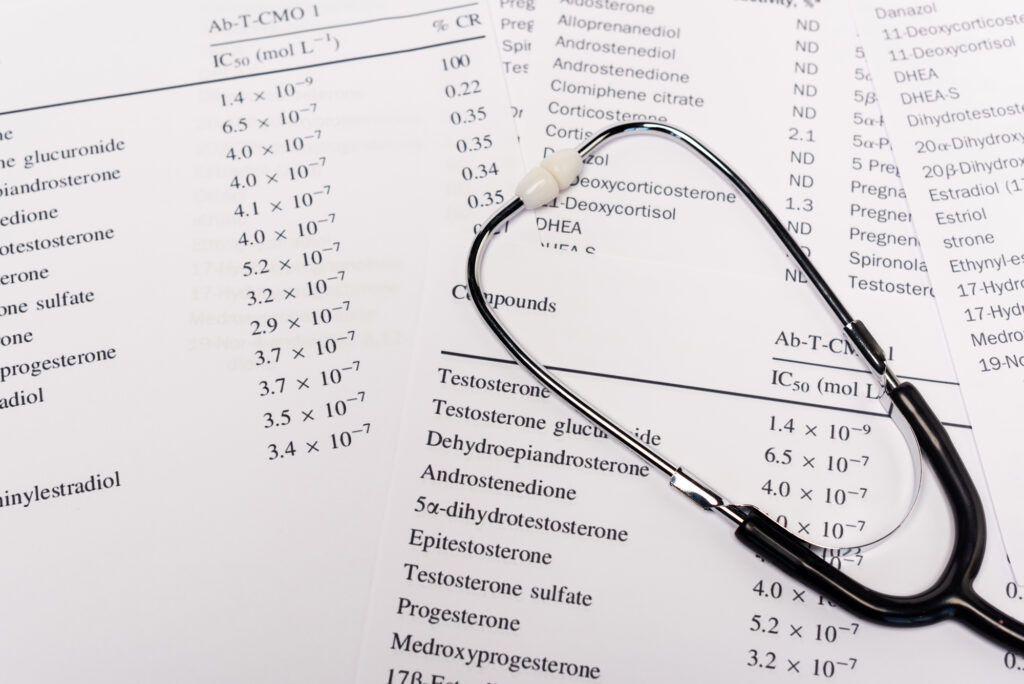Learn signs and symptoms of a hormone imbalance, why you should try to correct a hormone imbalance, some of the best herbal supplements for hormone imbalance and other natural ways you can balance your hormones.

The human body relies on many different hormones to function properly and maintain overall health. Some of these important chemical messengers include estrogen, testosterone, adrenaline, and insulin.
Commonly medical doctors will recommend synthetic hormone replacement therapies for hormone imbalances, like birth control, insulin injections, thyroid medications and more.
While hormone replacement therapy can reduce some symptoms of hormonal imbalance, there are some downsides to consider. Once hormone therapy is started, treatment must almost always continue for life. Additionally, there are potential side effects to hormone replacement therapy that may cause certain medical conditions including stroke, osteoporosis, heart disease, reproductive problems, and breast cancer.
Is there a way to balance hormone levels the natural way? There is good news. Some people can benefit from herbal supplements for hormonal imbalance. Keep reading to learn more about the root causes of hormonal imbalance and what options are available for restoring balanced hormones.
Disclaimer: This post includes affiliate links, and we will earn a commission if you purchase through these links. Please note that We’ve linked to these products purely because we recommend them, and they are from companies we trust. There is no additional cost to you.
What does hormonal imbalance mean?
Hormones are produced in the endocrine glands and circulate through your bloodstream, giving directions to tissues and organs. These chemical messengers help control a number of the body’s major processes, including reproduction and metabolism.
When a hormonal imbalance occurs, there is too much or too little of a certain hormone. Even small changes can have serious effects throughout your whole body.
Hormonal balance can be thought of much like a recipe. Too much or too little of any one ingredient can alter the finished product.
Yes, some hormone levels fluctuate naturally throughout the lifespan and may just be the result of the aging process. However, other alterations in hormone levels occur when your endocrine glands make a mistake in the recipe.

What are some symptoms of a hormonal imbalance?
There are many symptoms that are associated with hormonal imbalance. Many women with hormonal imbalances experience menopausal symptoms. The earliest signs of menopause (whether perimenopause, menopause, and postmenopause) are irregular menstrual cycle, heavier or lighter periods than normal, and vasomotor symptoms including hot flashes, night sweats, and flushing.
Balanced hormones produce a regular menstrual cycle. A disruption in normal hormone levels may cause more severe PMS symptoms and painful menstrual cramps.
Hormones play an important role in regulating the body’s metabolism and the body’s use of energy. Abnormal hormone conditions can cause weight gain or weight loss. There are several conditions that can affect weight as a result of unbalanced hormones.
People with a hormonal imbalance may also experience low energy levels and mood swings or depression. Other possible symptoms of hormonal imbalance include:
- hump of fat between the shoulders
- muscle weakness
- muscle aches, tenderness, and stiffness
- pain, stiffness, or swelling in your joints
- increased or decreased heart rate
- increased sensitivity to cold or heat
- constipation or more frequent bowel movements
- frequent urination
- increased thirst
- increased hunger
- decreased sex drive
- depression
- nervousness, anxiety, or irritability
- blurred vision
- infertility
- thinning hair or fine, brittle hair
- dry skin
- puffy face
- rounded face
- purple or pink stretch marks
Bear in mind that these symptoms are not specific to a hormonal imbalance. Having one or more of them does not necessarily mean that you have a hormonal imbalance.
Some of these symptoms may also indicate other chronic medical conditions. If you notice any of these symptoms or have noticeable changes in your body or energy levels, you should discuss this with your doctor.
What causes hormonal imbalance?
There are many possible causes of a hormonal imbalance. These causes can differ based on which hormone glands are affected.
Some causes of hormone imbalance include:
- Hormone therapy (such as birth control)
- Medications
- Cancer treatment
- Tumors (benign or cancerous)
- Eating disorders
- Stress
- Injury or trauma
- Menopause
- Pregnancy or breastfeeding
- Polycystic ovary syndrome

Conditions that may be associated with hormone imbalance
Having a hormone imbalance can cause many medical conditions. While hormonal imbalances may initially cause some of these health problems, having them can also lead to further hormonal imbalances. Some conditions associated with hormonal imbalance include:
- Estrogen dominance can cause altered sleep patterns, fluctuations in weight and appetite, increased perceived stress, and decreased metabolism.
- Polycystic Ovarian Syndrome (PCOS) can lead to infertility, weight gain, increased risk for diabetes, acne, abnormal hair growth.
- Low estrogen can lead to decreased libido, reproductive problems, irregular menstrual cycle and mood swings.
- Endometriosis is associated with hormonal imbalance, including increased estrogen production, metabolism and progesterone resistance. These hormonal changes cause increased proliferation, inflammation, pain and infertility.
- Hypothyroidism is a condition in which the body does not produce enough thyroid hormones; this can cause slowed metabolism, weight gain, fatigue, anxiety, irritability, digestive issues, and irregular periods.
- Low testosterone can cause loss of libido, erectile dysfunction, diminished cognitive function, depression, lethargy, osteoporosis, loss of muscle mass and strength.
- Hyperthyroidism & Grave’s disease may increase anxiety, hair loss, weight loss, IBS, difficulty sleeping and irregular heartbeat.
- Diabetes occurs when blood sugar is too high due to inadequate insulin production or insulin resistance; this can cause weight gain, nerve damage (neuropathy), vision problems, fatigue, difficulty breathing, dry mouth, poor wound healing.
- Adrenal insufficiency can cause fatigue, muscle aches and pains, anxiety and depression, poor sleep quality, poor cognition, and reproductive problems
- Breast cancer seems to be strongly associated with sex hormones in some types of breast cancer. Research shows that factors including aging, familial history of breast cancer, genetic changes, history of child birth and menopause, lack of physical activity, alcohol-use, diet and nutrition are risk factors of breast cancer.

Best herbal supplements for hormone balance
Some natural remedies can help improve hormone levels. The following are herbal supplements for hormone imbalance:
Adaptogenic Herbs
Adaptogens are plants and mushrooms that may help improve the body’s response to stress, anxiety, fatigue and overall well being. Adaptogens can be taken by adding them to food or beverages, or taking them as tinctures. Adaptogens can help bring the human body back to a steady balance by managing both physical and mental stressors.
Black cohosh
Black cohosh is a root that is sometimes used to balance estrogen levels. It may help to reduce hot flashes and other symptoms of menopause.
Black cohosh can be taken in capsule, liquid extract, or tea form. Dosage recommendations vary widely between brands.
Doses range anywhere between 20–120 mg of standardized black cohosh extract or powder daily. For menopause symptoms, taking at least 20 mg of black cohosh daily appears to be effective.
Chaste tree berry
Chaste tree berry has many phytochemicals including flavonoids that are thought to have many positive effects on your health. Many different types of flavonoids have been found in chasteberry. Research suggests that some of these flavonoids may influence certain hormone levels in your body especially prolactin, progesterone and to a certain extent estrogen.
Chasteberry is available in liquid, capsules, and tablets. Most clinical trials used a dose of 20-40 mg/day although some clinical trials have used doses as high as 1800 mg/day.
Dong quai
Dong quai is sometimes called the “female ginseng.” Although there are few scientific studies on dong quai, it is sometimes suggested to relieve cramps, irregular menstrual cycles, infrequent periods, premenstrual syndrome (PMS), and menopausal symptoms. You can find dong quai in a variety of forms, including tablets and powders.
Other natural ways to help balance hormones

Eat a balanced diet
Eating a healthy diet is one natural way to help balance hormones. For best results, include a balance of all macronutrients (carbohydrates, protein, and fat) from fruits, vegetables, whole grains, lean proteins, and healthy fats.
Studies show that a Western diet, primarily composed of refined sugars and animal products, is linked to higher estrogen levels, which are a risk factor for breast and ovarian cancers
However, eating a Mediterranean diet rich in whole grains, seeds, fish, legumes, and cruciferous vegetables like broccoli and cauliflower may help lower estrogen levels and cancer risk.
Protein
As commonly known, protein contains essential amino acids that your body cannot produce on its own. Protein is also needed to produce protein-derived hormones, also known as peptide hormones.
The endocrine system makes peptide hormones from amino acids. Peptide hormones play an important role in regulating processes in the body including growth, energy metabolism, appetite, stress, and fertility.
Protein intake affects hormones that regulate appetite and food intake and communicates information about energy status to your brain.
It is recommended to eat at least 20–30 grams of protein per meal. You can do this by eating high protein foods like eggs, chicken breast, lentils, or fish at each meal.
Carbohydrates
Choose complex carbohydrates that are high in fiber to help with hormone balance. Clinical trials have shown that fiber can increase insulin sensitivity and stimulate the production of hormones that make you feel full.
Fats
Including high quality healthy fats in your diet may help reduce insulin resistance and appetite. Medium-chain triglycerides (MCTs) are fats that are less likely to be stored as adipose (fat) tissue and more likely to be taken up directly by your liver use as immediate energy, which may promote increased metabolism.
Additionally, healthy fats like omega-3 fatty acids help increase insulin sensitivity by lowering inflammation and pro-inflammatory markers.
Eat avocados, almonds, peanuts, macadamia nuts, hazelnuts, fatty fish, and olive and coconut oils to increase your intake of these healthy hormone-balancing fats.

Eat plenty of cruciferous vegetables
Cruciferous vegetables, such as broccoli, cauliflower, kale, Brussels sprouts, spinach and cabbage, contain a compound called 3,3-Diindolylmethane (DIM). Research shows that this compound can lower high estrogen levels. DIM has also been shown to be chemoprotective, resulting in lower risk of breast cancer over time.

B vitamins
Vitamins B2, B6, and B12 have an important role in metabolism, acting as a necessary catalyst for many reactions in the body. Deficiency of these nutrients may negatively impact reproductive hormones levels. Eat salmon, leafy greens, eggs, dairy and legumes to increase your intake of B vitamins.
Lifestyle changes

Exercise regularly
Physical activity significantly impacts hormonal health. Not only does it improve blood flow to your muscles, exercise boosts hormone receptor sensitivity, meaning that it enhances the delivery of nutrients and hormone signals.
Strength training, aerobic activity, walking, and other forms of exercise may modify hormone levels to reduce your risk of disease and prevent muscle mass decline as you age.
Reduce stress and practice self-care
Stress can negatively affect your hormones in several ways. Cortisol is known as the stress hormone because it helps your body cope with long-term stress.
The human body’s response to stress stimulates a series of events that lead to cortisol production. Once the stress trigger has passed, the response ends. Unfortunately, chronic stress weakens the feedback mechanisms that help the endocrine system return to normal.
Chronic stress may cause increased appetite, weight gain, and insulin resistance.
Dedicate 10-15 minutes daily to stress-reducing techniques and self-care, even if it’s difficult to find the time. Try meditation, yoga, and listening to relaxing music.
Get quality sleep
Good nutrition and regular exercise don’t matter unless you’re getting sufficient, high-quality sleep. Poor sleep is linked to imbalances in many hormones, including insulin, cortisol, leptin, ghrelin, and human growth hormone (HGH).
Bottom Line
Hormones are chemical messengers that play an important role in the human body. When hormone levels are unbalanced, this can affect overall health. There are some natural ways that may help with hormone balance. Eating a balanced diet, exercising regularly, managing stress, and quality sleep can help with hormonal imbalance. Additionally, some people can benefit from herbal supplements for hormone imbalance.
Take action
The most important thing you can do to balance your hormones is make healthy lifestyle changes. Herbal supplements won’t outwork poor diet, elevated stress, and lack of exercise.
Start adding more high fiber plants to your diet, including cruciferous vegetables. Get outside and go for a walk each day, take time to relax for 10-15 minutes, and prioritize a good sleep schedule each day.





Leave a Reply